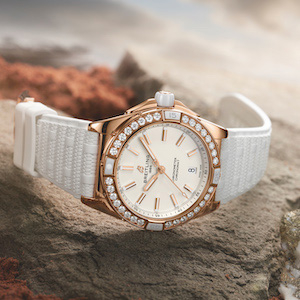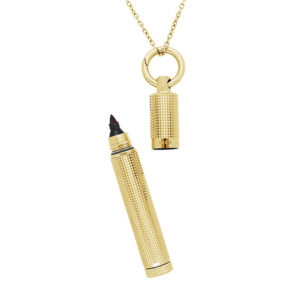
On Oct. 20, Breitling announced that in the next few years, it will use only lab-grown diamonds and artisanally sourced gold on its watches.
The Swiss watch company made its announcement with the release of its Super Chronomat Automatic 38 Origins (pictured), its first watch to feature man-made diamonds.
According to a spokesperson, Breitling currently uses diamonds only on watches in its Chronomat line, one of 10 in the Breitling portfolio. It plans to switch to lab-grown diamonds only by 2024.
The watch will also feature traceable gold, sourced from a single artisanal or small-scale (ASM) mine that meets the criteria set out by the Swiss Better Gold Association, which works to improve living conditions in mining communities.
Breitling is working toward having all of its gold traceable to specific artisanal mines by 2025.
Its lab-grown diamonds, produced in India by Fenix—a company associated with the family that owns Indian sightholder Mahendra Brothers—have been “certified sustainably rated” by SCS Global Services.
Along with its switch to lab-grown diamonds, Breitling will make a contribution to a “social impact fund that supports diamond-producing communities.”
Breitling noted that both the watch’s gold and diamonds are fully traceable—which is unusual in the Swiss watch business, generally known for its opacity.
“Until now, there have been limits on how far you could trace precious materials,” said a statement. “Even when following industry best practices, tracking gold and the small ‘melee’ diamonds used in watchmaking to their origins had been nearly impossible. By default, these raw materials tend to be combined from many different sources—meaning their provenance literally gets lost in the mix.”
The entire chain of custody for the diamonds and gold will be “independently verified and recorded in a blockchain-backed NFT (non-fungible token) that comes with every Super Chronomat Origins,” Breitling said. The company’s sustainability report can be seen here.
Many sustainability experts consider trackable ASM gold better than recycled gold, as recycled gold can be derived from a variety of sources, which are often obscured and sometimes problematic.
“Seeing Breitling’s investment in this initiative gives me hope,” says longtime sustainability advocate and consultant Christina Miller. “They are helping to dispel the myth that developing products with materials of known provenance needs to be an all-or-nothing thing. This isn’t all of their watches at this time, and that’s OK.”
She hopes for more information on the premiums the ASM miners will receive.
Miller does take issue with Breitling’s descriptions of its lab-grown diamonds as “conflict-free” in its marketing, noting many communities still depend on mined diamonds, and she feels the industry has a responsibility to them.
Along with its professed sustainability goals, there are business reasons for Breitling to switch to lab-grown diamonds, which are generally cheaper than natural gems.
“Breitling is using the lower costs to increase the volume of diamonds used in their watches and to fund the support activities in the communities,” says a spokesperson.
One diamond dealer has told JCK that the new era of natural and lab-grown has made it difficult to sell to watch companies, since the cost of testing parcels of small goods can be larger than any profit he makes.
Photo courtesy of Breitling
- Subscribe to the JCK News Daily
- Subscribe to the JCK Special Report
- Follow JCK on Instagram: @jckmagazine
- Follow JCK on X: @jckmagazine
- Follow JCK on Facebook: @jckmagazine







